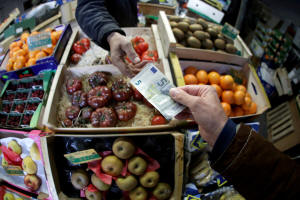|
Gross domestic product in the euro zone expanded by 0.3% in the
second quarter, above expectations of 0.2% in a Reuters poll of
economists. Compared to a year earlier, growth was 0.6% against
expectations of 0.5%.
That compared with zero growth in the previous quarter for the
20-nation euro zone and a 0.1% quarter-on-quarter decline in the
fourth quarter of 2022.
Among the bloc's biggest countries, France and Spain grew at a
sustained pace on the back of stronger exports and tourism while
Germany, the euro zone's biggest country, registered no growth
and Italy suffered a contraction.
Surging inflation due to high energy costs following Russia's
invasion of Ukraine and rising food prices, higher interest
rates and waning confidence have taken a toll on the single
currency's economy.
But the economy has displayed some resilience too, much like
during the COVID-19 pandemic, when growth outperformed
expectations as businesses adjusted faster to changed
circumstances than policymakers had predicted.
But even if the bloc is doing better than expected, growth in
2023 is likely to be weak due to a large drop in real incomes
and surging interest rates.
The European Central Bank raised the possibility of pausing its
interest rate hikes in September as inflation pressures show
tentative signs of easing and recession worries mount.
(Reporting by Philip Blenkinsop, Editing by Charlotte Van
Campenhout)
[© 2023 Thomson Reuters. All rights
reserved.]
This material may not be published,
broadcast, rewritten or redistributed.
Thompson Reuters is solely responsible for this content.

|
|




